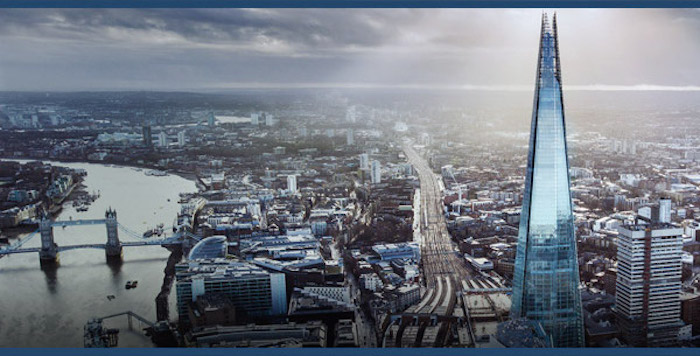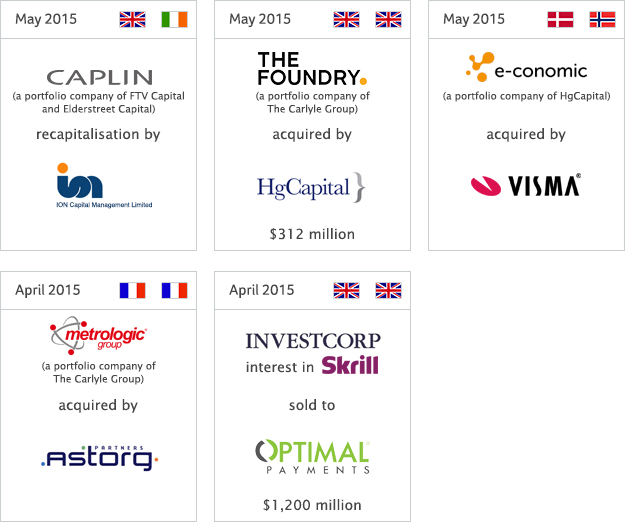

Arma Partners: Q2 BulletinArma Partners, the leading independent Communications, Media and Technology (CMT) focused advisory firm, shares an update on the development of M&A markets and trends in the CMT sector in Q2 of 2015. OverviewDuring Q2 2015, the value of CMT transactions in the US and Europe grew 26% from the prior year, reaching $230 billion*. Activity in the US was particularly strong, accounting for $184 billion, or over 80% of quarterly M&A value. This strength in activity was driven by the continued strong momentum of US corporate earnings, freely available debt financing and buoyant equity market valuations. There were 13 transactions announced with valuations in excess of $1 billion, dominating the quarter with a total $166 billion, or 90% of value. These large capitalisation deals included almost $90 billion of cable acquisitions by Charter Communications, Avago’s $35 billion purchase of Broadcom, Intel’s $16 billion bid for Altera, Informatica’s $5 billion take-private and Verizon’s $3.9 billion swoop for Aol. After an extremely active Q1, European CMT M&A activity remained solid during Q2 in local currency terms, but experienced a decline of 15% in US Dollar terms to $43 billion, attributable to weakness in the Euro, which had fallen 18% over the same period. The impact of macroeconomic uncertainty regarding a potential “Grexit” and other considerations were felt particularly in larger capitalisation transactions, which accounted for only six deals worth $32 billion, or 74% of quarterly value. Europe’s most sizable deals included Nokia’s $17 billion acquisition of Alcatel-Lucent, Equinix’s $4.1bn bid for Telecity and Optimal Payments’ $1.2 billion purchase of Skrill. *All Q2 M&A data sourced from Mergermarket. TechnologyPrivate equity buyers, armed with ample dry powder and better positioned to exploit favourable debt market conditions than rival strategic acquirers, have proved both willing and able to drive M&A activity within the rapidly evolving Software sector. Permira and CPPIB completed a $4.8bn take-private of US data software and services company Informatica, Visma acquired e-conomic, and HgCapital and Astorg Partners respectively acquired creative software provider The Foundry (for $312 million) and measurement software provider Metrologic Group from Carlyle. Arma Partners advised on the latter three transactions. Levels of M&A activity in the FinTech sector remain high, with payments and alternative financial services leading the way. PayPal, for example, is set to become a significant market consolidator as it spins out of eBay, having already demonstrated its intention to expand its presence both internationally and across products through its acquisition of Xoom. Financial services firms are responding to the sector disruption by setting up incubator funds and increasing their investments in emerging technologies, and established tech giants are also viewing the sector with interest – Google Ventures has invested in more than twice as many FinTech startups as any other company since 2010 (CB Insights, June 2015). While private equity continues to be extremely active, strategic activity has heightened, with Optimal Payments’ landmark $1.2 billion acquisition of Skrill (on which Arma Partners advised) representing one of the largest European technology transactions in the period (see Deal Spotlight below). Deal Spotlight
$1.2bn
acquisition of 
April 2015
In Electronics, the theme of consolidation was most evident in the semiconductor market, as chipmakers responded to growing pressure on the tech supply chain by upscaling their operations. Avago’s acquisition of Broadcom had the added consequence of also creating a challenger to Intel and Qualcomm’s leading market positions, though was countered by Intel’s takeover of Altera. A similar dynamic was in evidence in the Communications Technology sector in Q2, as smaller European telecoms equipment players pursued deals to challenge market leaders Ericsson and Huawei. This was exemplified by Nokia’s $17bn acquisition of Alcatel-Lucent, a deal which will bolster Nokia’s foothold in the key US market, and which Alcatel-Lucent executives justified to shareholders on the basis of the company otherwise lacking “critical mass”. Going forward, the merger of these Finnish and French communication tech companies is likely to provide a compelling case study in the challenges in and importance of reconciling the cultural differences associated with cross-border tech tie-ups. Communications and Internet InfrastructureConsolidation remained a key theme in Q2 in both the large cap and middle markets, and in particular in the US cable market: Charter Communications is seeking to create the second biggest player by supplementing its acquisition of Bright House Networks with a $55bn deal for Time Warner Cable, which represents a $10bn premium on what market leader Comcast was set to pay before regulators intervened. Altice’s entry into the US market with its acquisition of 70% of Suddenlink at a valuation of $9 billion is also expected to increase demand for US cable assets. Transatlantic buyers were eager to capitalise on the strength of the US Dollar against European currencies and benefit from medium-term upside in European market fundamentals. This was highlighted by Equinix’s $4.1bn acquisition of UK-listed data centre provider Telecity (see Deal Spotlight below), Fidelity’s bid to take Colt private and Charlesbank’s acquisition of UK communications and managed services provider Six Degrees. Internet Infrastructure markets have also remained active, underpinned by continued strong growth, with Lightower announcing its acquisition of Fibertech Networks for $1.9bn, Eurofiber being sold to Antin Infrastructure Partners for €875m and QTS Realty Trust buying US managed service provider Carpathia for $326m. Deal Spotlight
$4.1bn
acquisition of 
May 2015
Communications and internet infrastructure players continue to benefit from the growth opportunities afforded by the ever-increasing reliance of businesses on cloud computing and data networks: 2014 was the first year in which the majority of workloads were processed in the cloud (HP/Mashable, May 2015). The increased demand for cloud infrastructure will encourage elevated levels of deal activity and attractive valuations within the communications and internet infrastructure sectors. MediaTransaction activity in Media during Q2 was notable for activity in ‘legacy’ areas of the online market landscape: classifieds, video and training. Media transactions amounted to $89 billion in the US and Europe during this period. Despite significant growth year-on-year to $5 billion in Q2, European Media M&A accounted for only 11% of total European CMT transaction value. Strategic buyers on both sides of the Atlantic have responded to the surge in consumption of online and mobile video. The number of global subscribers to streaming video services is predicted to grow almost fourfold by 2020 (Juniper Research, May 2015) and mobile video traffic is projected to grow 55% per year globally until 2020 (Ericsson Mobility Report, June 2015). These strong underlying fundamentals were a key driver in Verizon’s $3.9bn acquisition of AOL (see Deal Spotlight below) and also Vivendi’s long-anticipated acquisition of Dailymotion for $300 million. Deal Spotlight
$3.9bn
acquisition of 
May 2015
eCommerce, the strongest area of Media/Internet M&A in Q1, continued to see activity, notably within the food takeaway e-marketplaces. This was best highlighted by European market leader Just Eat’s purchase of Australia/New Zealand-based counterpart Menulog for $700m (a deal which, in valuing Menulog at a staggering 371 times EBITDA, highlighted the premium that internet buyers will pay for market dominance) and German online takeaway company Delivery Hero paying $589m to acquire Turkish food ordering platform Yemeksepeti from its private equity owners, following its own capital injection from Rocket Internet. Arma Partners advised on five deals in the second quarter of 2015:
Download PDF www.armapartners.com Unsubscribe |